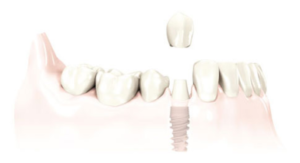DENTAL IMPLANT
Say goodbye to the tooth fairy thanks to dental implants
Missing teeth are problematic in several respects. The gaps they leave are often deemed unaesthetic and may leave you feeling distressed. More importantly, they may also affect your overall health by weakening your bone structure and leaving the rest of your teeth and gums exposed and more susceptible to further damage and infection. It is therefore important to take every step to limit such risks.
Who is this for?
Tooth loss may originate from various disorders, from trauma to cavities that are left uncared for.
In all those instances, dental implants may be the only solution to restore a bright and healthy smile.
Do I need dental implants?
Tooth replacement is needed so your teeth can function properly.
Other replacement options are possible with your dentist, as in bridges and dentures. Those options may, however, quickly prove unsatisfactory.
Dentures are the cheapest option available but can be uncomfortable. They are removable appliances and you will need to remove them to clean them and while you sleep.
Bridges are the second-best option after implants. While these are fixed appliances, the longevity depends on the health and strength of the adjacent teeth. Should any one of the teeth holding the bridge be damaged, the entire structure is lost.
Overall, dental implants meet all these shortcomings and should be the foremost treatment for missing teeth. They are permanent, stable and generally hassle-free once fixed.
What are dental implants?
Implants are titanium screw-like structures that are used to replace one or all of your teeth. Not only do implants restore a person’s smile with a natural and life-like restoration, they are also able to re-establish a person’s chewing ability. Consequently, implants provide security, comfort and confidence by delivering a permanent solution for missing teeth. Implants are placed in areas of existing bone and become integrated within the bone. They can be used to support a single tooth, multiple teeth or even a completely missing dentition, depending on the position and the number of implants placed within the jawbone.
Your periodontist will place your dental implants under local anesthesia at the clinic. Unfortunately, not all patients are eligible for dental implants (especially those suffering from diabetes or uncontrolled periodontitis) but age is never a contraindication.
Do I need a referral?
The short answer is no, a referral is not necessary for a periodontal consultation.
There are several ways treatment from a periodontist may be sought. If you think you could benefit from dental implants, feel free to schedule an appointment with one of our periodontists.
WHY DENTAL IMPLANTS
4 reasons to consider having a dental implant
Severe tooth decay.
When a tooth has been severely decayed, it may be necessary to remove the tooth and replace it with an implant. While a dental filling could be seen as an option, if too much decay is present, implants may prove to be the best option available.
Loss of an entire tooth
You can lose an entire tooth from an accident. Sometimes, the entire tooth is avulsed, whereas other times the root(s) of the tooth might still be intact. Nonetheless, an implant is still an ideal option. While it does entail a surgical procedure, you can expect a permanent solution that is fixed, offering comfort and function in the area of the lost tooth.
When wearing dentures or using a fixed bridge is no longer possible
Sometimes, it is no longer possible for a patient to wear dentures or use fixed bridges. Dentures may need constant fitting, which is undesirable, and bridges can damage the jawbone structure under missing teeth. Dental implants do not share these shortcomings: they are inserted within the dental arch and fuse with your natural bone. They provide both the most aesthetic and most comfortable results.
If the jawbone is extensively deteriorated
Unfortunately, your mandible and your maxilla – your jaw bones – can potentially deteriorate to such a great extent that it might affect the overall shape of your mouth. Dental implants may help strengthen your existing jawbone and correct the damage that has already been done.

There are several ways treatment from a periodontist may be sought. If you feel you could benefit from dental implants, a consultation with a periodontist may be recommended. A referral is not necessary for a periodontal consultation with our specialists.
Dr. Romina Perri
DMD, Cert Perio, MS (Perio), FRCD(C), Diplomate ABP
TYPES OF DENTAL IMPLANTS
How do we get back your missing teeth?
Depending on your clinical situation, Dr. Perri will work with your general dentist to devise the best possible treatment plan for your implant therapy.
In the case of a single missing tooth, an implant is inserted and acts as an artificial root, over which a crown is then fixed. This a vastly superior method compared to a bridge since it does not require adjacent and healthy teeth to be ground down. The implant will strengthen the bone where it is anchored, stimulating it and maintaining it over time despite the missing tooth. This is unlike a bridge which actually leads to bone loss (loss in height and width) under the unsupported tooth (or pontic). This can result in an unattractive dark space at the gum line.

In the case of multiple missing teeth, several implants can be used to support a bridge or a complete denture. Implant-supported dentures offer a significant advantage over conventional dentures, because they stay securely in place and help to prevent bone loss. There are several other advantages to this. There is no slipping or shifting, you can bite and chew naturally, your taste ability may even improve, and your speech is not as greatly affected as with regular dentures.

